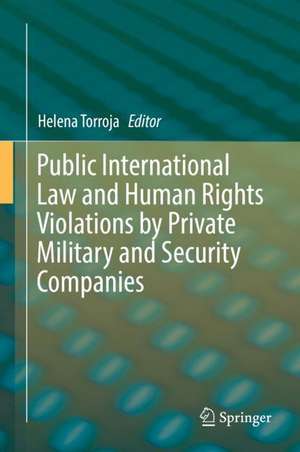Public International Law and Human Rights Violations by Private Military and Security Companies
Editat de Helena Torrojaen Limba Engleză Hardback – 13 dec 2017
| Toate formatele și edițiile | Preț | Express |
|---|---|---|
| Paperback (1) | 690.62 lei 6-8 săpt. | |
| Springer International Publishing – 24 mai 2018 | 690.62 lei 6-8 săpt. | |
| Hardback (1) | 944.51 lei 6-8 săpt. | |
| Springer International Publishing – 13 dec 2017 | 944.51 lei 6-8 săpt. |
Preț: 944.51 lei
Preț vechi: 1151.84 lei
-18% Nou
Puncte Express: 1417
Preț estimativ în valută:
180.73€ • 188.70$ • 149.58£
180.73€ • 188.70$ • 149.58£
Carte tipărită la comandă
Livrare economică 04-18 aprilie
Preluare comenzi: 021 569.72.76
Specificații
ISBN-13: 9783319660974
ISBN-10: 3319660977
Pagini: 150
Ilustrații: IX, 158 p. 4 illus. in color.
Dimensiuni: 155 x 235 mm
Greutate: 0.42 kg
Ediția:1st ed. 2017
Editura: Springer International Publishing
Colecția Springer
Locul publicării:Cham, Switzerland
ISBN-10: 3319660977
Pagini: 150
Ilustrații: IX, 158 p. 4 illus. in color.
Dimensiuni: 155 x 235 mm
Greutate: 0.42 kg
Ediția:1st ed. 2017
Editura: Springer International Publishing
Colecția Springer
Locul publicării:Cham, Switzerland
Cuprins
Foreword by Patricia Arias.- Introduction by Helena Torroja Mateu.- Afghanistan and Syria: Non-state Actors and their Negative Impact on Human Security by Mario Laborie.- Delimitation and Presence of PMSCs: Impact on Human Rights by Felipe Daza.- The Ineffectiveness of the Current Definition of a ‘Mercenary’ in International Humanitarian and Criminal Law by José L. Gómez del Prado.- Private Military and Security Companies and Human Rights by Carlos Lopez-Hurtado.- International Soft Law Initiatives: The Opportunities and Limitations of the Montreux Document, ICoC, and Security Operations Management System Standards by Rebecca DeWinter-Schmitt.- Ideas on the International Minimum Standard for the Privatization, Export, and Import of Armed Coercion by Helena Torroja Mateu.- Conclusion by Helena Torroja Mateu.
Notă biografică
Helena Torroja, University of Barcelona, Law School, Barcelona, Spain
Textul de pe ultima copertă
This book explores the human rights consequences of the new mercenarism, as channeled through so-called private military and security companies (PMSCs), and offers an overview of the evolution and status quo of both non-legal (soft law and self-regulation) and legal initiatives seeking to limit them. It addresses various topics, including the impact of the presence of non-state actors on human security using the cases of Afghanistan and Syria; research on PMSCs’ impact on human rights in specific cases; the insufficiency and ineffectiveness of existing direct and indirect legal prohibitions on the use of mercenaries; various aspects of international human rights law and international humanitarian law related to the conduct of PMSCs; soft-law and self-regulation mechanisms; and the international minimum standard in general international law regarding the privatization, export, import, and contracting of PMSCs.
Caracteristici
Focuses on human security and the impact of PMSCs on the protection of human rights Addresses soft-law initiatives in addition to existing international hard-law norms to regulate PMSCs Examines the possibility of introducing an international minimum standard to regulate the industry with a view to assisting policymakers, the Working Group on Mercenaries, civil society, etc
